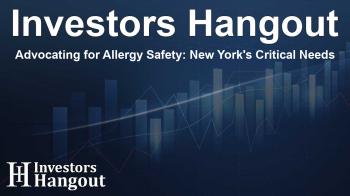Advocating for Allergy Safety: New York's Critical Needs

Understanding Life-Threatening Allergies in New York
Allergic reactions can be perilous, and for more than 2 million New Yorkers managing severe allergies, having access to accurate food labeling is essential. This vulnerable population includes over 200,000 children who are at risk as they navigate their daily lives. Epinephrine, a life-saving medication when administered promptly, can stop an anaphylactic reaction and potentially save lives.
The Importance of Accurate Food Labeling
Food companies have a crucial responsibility to provide clear and accurate labels. With the number of people affected by life-threatening allergies on the rise, ensuring accurate labeling on packaged foods is critical. This is underscored by the bill on Food Labeling, known as A6558/S5381, which advocates for stricter oversight and standards in food labeling practices. This initiative aims to protect individuals from accidental exposure to allergens, which could lead to life-threatening situations.
Why This Legislation Matters
These legislative efforts, backed by advocates and concerned families, emphasize the need for stronger regulations in food labeling. By improving the accuracy of labels, the risk of accidental allergic reactions can be substantially decreased, making our communities safer for those with severe allergies.
Allergy Prevention Strategies
Prevention is key when it comes to allergies. The Allergy Prevention bill, designated A771/S7915, acknowledges this by introducing a revolutionary approach. Research indicates that introducing peanut and egg proteins early in an infant's diet could prevent allergies from developing. This bill emphasizes the importance of insurance coverage for these nutritional supplements, ultimately leading to cost savings for families.
How Insurance Affects Allergy Prevention
If A771 is enacted, families would be relieved from the financial burden of preventive measures, ensuring that they have access to this critical aspect of early childhood care. The potential savings for New Yorkers and their insurance providers could reach millions, showcasing the dollar value alongside the health value of this legislation.
Innovations in Epinephrine Delivery
With the advancements in medical technology, it is vital that our laws keep pace. The Expanded Definition of Epinephrine Delivery Products, put forward in bill A5392/S7807, highlights the necessity of updating legal references to reflect the diverse range of epinephrine delivery devices available in the market. This change is essential for ensuring that emergency medical training programs have the most up-to-date information on all FDA-approved devices.
Training and Awareness Programs
Many training programs that educate staff and students on managing allergic reactions rely on this updated information. By aligning legal definitions with current industry practices, we can ensure better preparedness in schools and other environments where allergic reactions may occur.
Ensuring Public Access to Epinephrine
Every individual, especially the 200,000 students in New York schools, should have access to life-saving epinephrine products. The Public Access to Epinephrine Products bill, A2648/S5589, aims to create additional layers of protection for individuals with diagnosed and undiagnosed allergies. Thanks to the sponsorship of key legislators, this initiative seeks to save lives in educational settings.
Why Schools Need This Legislation
It is critically important for schools to be equipped with epinephrine products, ensuring that both students and staff can act quickly in the event of an anaphylactic reaction. By having these products readily available, schools can foster a safer learning environment for all students.
Join the Effort for Safer Allergies
The call to action from Allergy Advocates NY is clear: we need collective efforts from everyone, including legislators, advocates, and families, to protect those managing life-threatening allergies. Together, we can advocate for safer legislation and make New York a more secure place for individuals battling allergies.
Frequently Asked Questions
What is the purpose of A6558/S5381?
A6558/S5381 focuses on enhancing food labeling requirements to ensure better protection for those with life-threatening allergies.
How can early introduction of allergens prevent allergies?
Research suggests that early exposure to allergens like peanuts and eggs can help build tolerance and prevent the development of allergies in infants.
What changes does A5392/S7807 propose?
This bill aims to update legal references to epinephrine delivery products, accommodating innovations in allergy treatment devices.
Why is public access to epinephrine important?
Public access ensures that individuals at risk, especially in schools, have immediate access to life-saving medication in case of an allergic reaction.
How can individuals support these legislative efforts?
Individuals can support these efforts by engaging with local representatives and advocating for the proposed bills impacting allergy safety.
About The Author
Contact Henry Turner privately here. Or send an email with ATTN: Henry Turner as the subject to contact@investorshangout.com.
About Investors Hangout
Investors Hangout is a leading online stock forum for financial discussion and learning, offering a wide range of free tools and resources. It draws in traders of all levels, who exchange market knowledge, investigate trading tactics, and keep an eye on industry developments in real time. Featuring financial articles, stock message boards, quotes, charts, company profiles, and live news updates. Through cooperative learning and a wealth of informational resources, it helps users from novices creating their first portfolios to experts honing their techniques. Join Investors Hangout today: https://investorshangout.com/
The content of this article is based on factual, publicly available information and does not represent legal, financial, or investment advice. Investors Hangout does not offer financial advice, and the author is not a licensed financial advisor. Consult a qualified advisor before making any financial or investment decisions based on this article. This article should not be considered advice to purchase, sell, or hold any securities or other investments. If any of the material provided here is inaccurate, please contact us for corrections.

